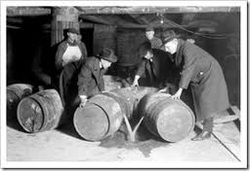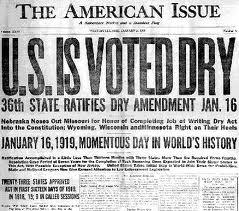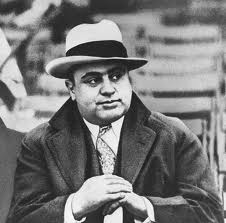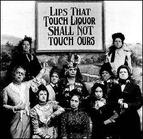Prohibition and Crime
Essential Question : Would you consider the government's passage of the 18th amendment an over-reaction to the problem of alcohol? How do the actions of gangsters/bootleggers support the position that the government and temperance leaders had gone too far?
Yes, I would consider that the government was over-reacting when they passed the 18th amendment, which prohibited alcohol in the United States. It was an over-reaction, because it wasn't necessary for them; they could have created rules and regulations instead to see if it was that big of a problem, and if it ended up being a very large problem, then they could have created an amendment which prohibited alcohol. The actions of the gangsters and bootleggers show that the government and temperance leaders had gone too far, because there was a demand for it, and they provided the public with illegal alcohol. Even though many people did support the temperance movements, the demand for alcohol greatly outweighed the demand for sobriety.
Yes, I would consider that the government was over-reacting when they passed the 18th amendment, which prohibited alcohol in the United States. It was an over-reaction, because it wasn't necessary for them; they could have created rules and regulations instead to see if it was that big of a problem, and if it ended up being a very large problem, then they could have created an amendment which prohibited alcohol. The actions of the gangsters and bootleggers show that the government and temperance leaders had gone too far, because there was a demand for it, and they provided the public with illegal alcohol. Even though many people did support the temperance movements, the demand for alcohol greatly outweighed the demand for sobriety.
Volstead Act

The Volstead Act, formally known as the National Prohibition Act, was the enabling legislation for the eighteenth amendment. This Act's main purposes were to prohibit intoxicating beverages and regulate the manufacture, production, use and sale of high proof spirits for other than beverage purposes. Law enforcement for this act was extremely difficult, and in New York alone, the first 4,000 arrests ended in less than 500 indictments, which led to only 6 convictions and not even a single jail sentence. By, 1925, the demand for alcohol was majorly overshadowing the demand for sobriety.
18th Amendment

When the 18th Amendment was passed on December 18, 1917, it established prohibition in the United States, and was the only amendment to have a time delay after it's ratification before it became effective throughout the United States. However, no one seemed to understand how difficult it would be to enforce this law, or understood how prohibition would lead to so much organized crime. Although the Amendment was ratified by almost every state, it was not very affective, because of the difficulty to enforce the law.
Gangs and Crime

The increase of Gangs and crime started with the passage of the 18th Amendment. The amendment, which prohibited alcohol, angered many. People wanted to find ways around this amendment, so bootlegging increased substantially. Millions were made from the sale of alcohol, which helped expand gangsters other activities such as: prostitution, gambling, and narcotics. Along with bootlegging, bank robberies were also very common. 1920's gangsters mark a decade of silk suits, diamond rings, guns, booze, and girls. Big gangsters included: Al Capone, Baby-Face Nelson, John Dillinger, and Bonnie and Clyde.
Thinking Like a Historian
Cause and Effect : With the passage of the 18th Amendment, the amount of gangsters and bootleggers increased. They increased because they wanted to produce and provide the illegal alcohol to people all over. This was a direct cause and effect relationship.

